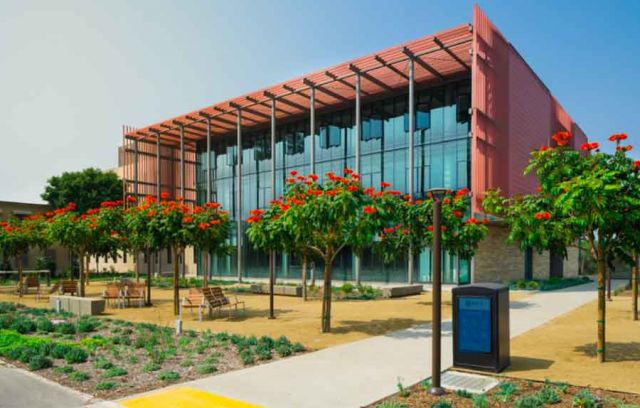Henley Hall "Best in Bldg"
Henley Hall achieves LEED Platinum, wins 2021 American Architecture Award, other honors

Excerpt from The UCSB Current article "Best in Building"
The sleek and shimmering modern building that houses UC Santa Barbara’s Institute for Energy Efficiency is earning major accolades for its overall design and for its sustainability features.
Designed by the firm KieranTimberlake, a leader in practice-based architectural research and sustainable buildings, Henley Hall has received The American Architecture Award for 2021. Presented together by The Chicago Athenaeum: Museum of Architecture and Design and The European Centre for Architecture Art Design and Urban Studies, the global accolade honors the best in new and cutting-edge design in the U.S., and promotes American architecture and design in the U.S. and abroad.
The facility has been further recognized by the American Institute of Architects (AIA) with multiple awards from AIA Santa Barbara, AIA Philadelphia and AIA Pennsylvania.
And the icing on the efficiency cake: Henley Hall has received the U.S. Green Building Council’s 2021 Leadership in Energy and Environmental Design (LEED) Platinum certification — the top rating for sustainable buildings. LEED certification is a globally recognized symbol of sustainability achievement and leadership.
“Henley Hall is a reflection of UC Santa Barbara’s commitment to energy efficiency, and our campus is thrilled that this state-of-the-art building has been nationally recognized for its innovative architectural design and superb sustainability,” said Chancellor Henry T. Yang. “Such qualities are paramount to furthering our stature as a world-class research institute with cutting-edge facilities, teaching, and research. We are immensely grateful to donors Jeff and Judy Henley and Shawn and Brook Byers for their tremendous vision and generosity in making Henley Hall and these subsequent recognitions a reality for our campus.”
The building officially “opened” in late 2020. It was nearly a decade in the making.
UC Santa Barbara alumnus Jeff Henley and his wife Judy Henley, an honorary alumna, sparked the donor-funded project with a $50 million gift to the College of Engineering in 2012. Silicon Valley-based alumna Shawn Byers and her husband, Brook, also made a significant contribution.
The 50,000-square foot building is a model of efficiency, with passive features such as solar shading and high-performance skin and active features including demand-controlled ventilation and high-efficiency lighting modulated for occupancy and outdoor conditions. More than 20% recycled materials were used in its construction, which is primarily concrete, glass and terra cotta.
A state-of-the-art research and learning facility, Henley Hall has both wet and dry labs, collaborative break-out spaces, conference rooms, a 124-seat lecture hall, and faculty and administrative offices. On the east side of the building, workspaces and offices have operable windows that stimulate airflow through an airy and light-filled multistory atrium. The west side, where labs are situated, uses air-monitoring and occupancy sensors to reduce ventilation-driven energy use while protecting the safety of occupants and their research.
“We designed Henley Hall to be a very energy-efficient building from the ground up,” said John Bowers, director of the Institute for Energy Efficiency and a professor of electrical and computer engineering. “There are many different features, from natural lighting and ventilation to optimum air handling in chemical labs. It is great to have that effort recognized.
“Henley Hall is a wonderful building to work in,” Bowers continued. “Since it was designed to be naturally lit and naturally ventilated, it has a fresh, clean feel which we all love. There is a lot of common space, and with the return to campus, it has been great to encounter faculty and students on a daily basis. The labs have worked out well and we have expanded the range of research we are involved in, in particular our research in quantum computing and artificial intelligence.”
The UCSB Current "Best in Building" (full article)